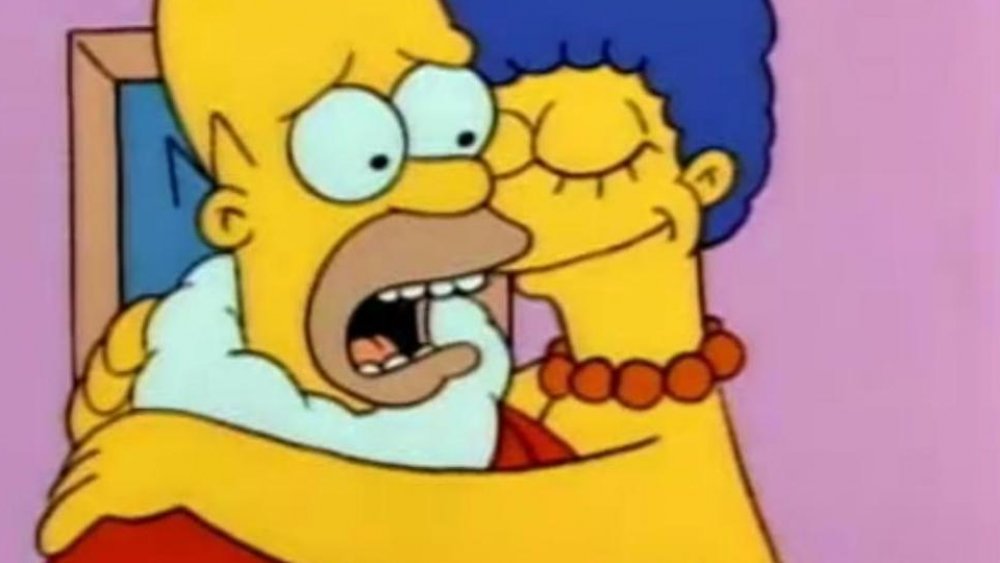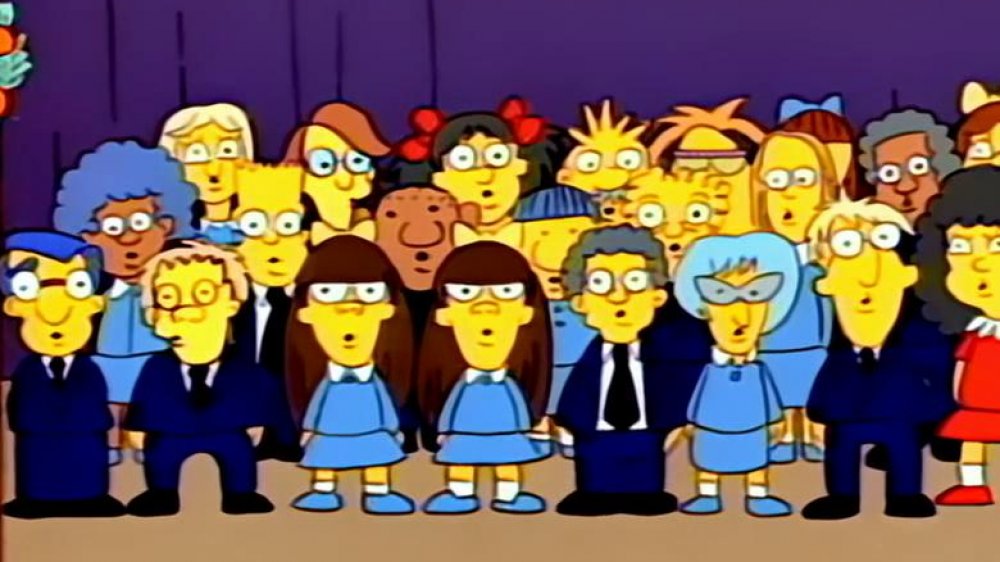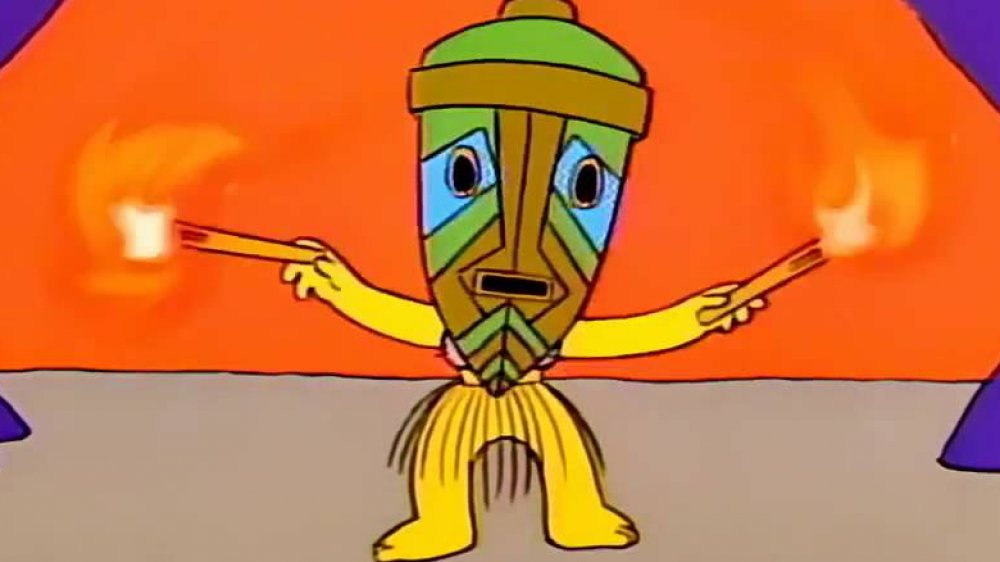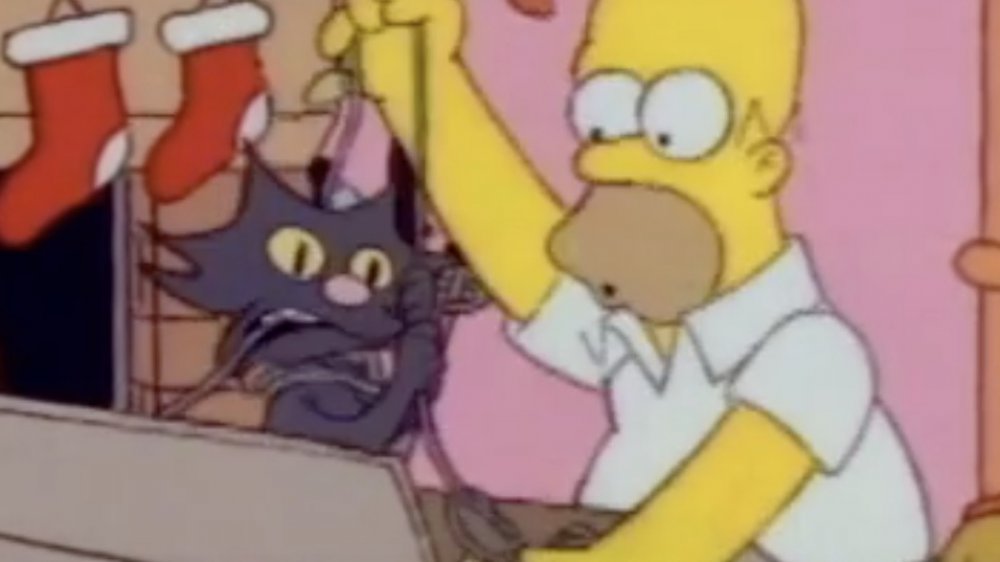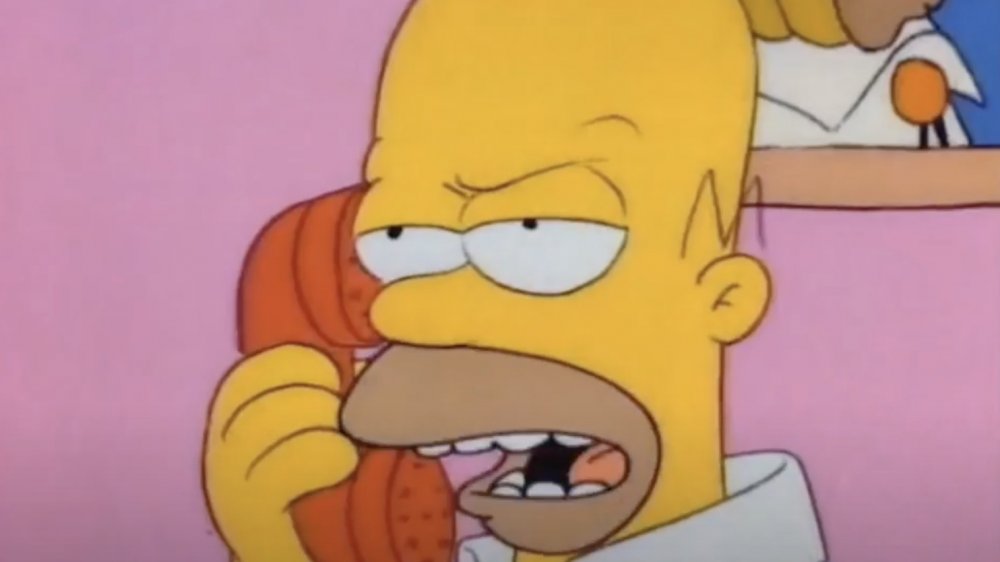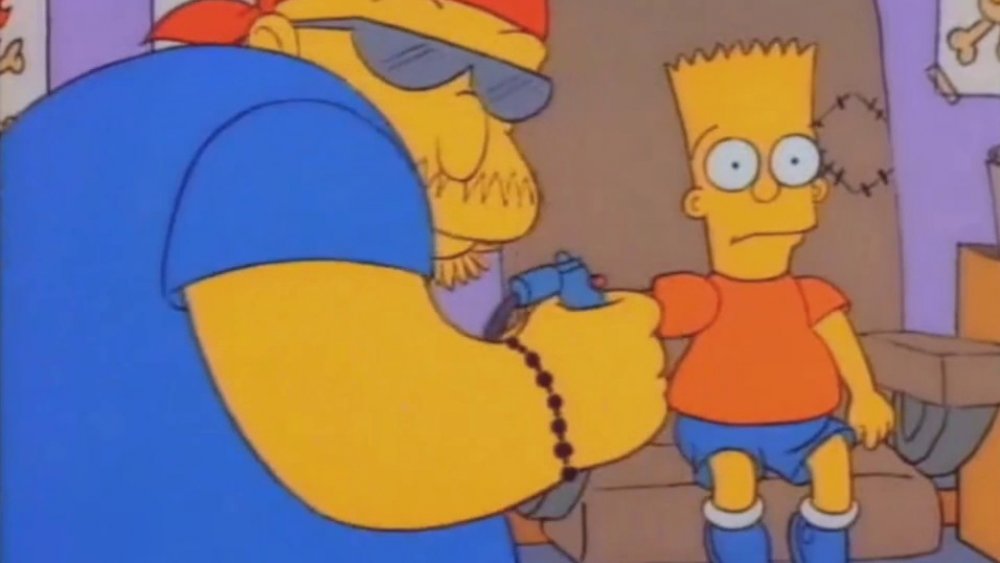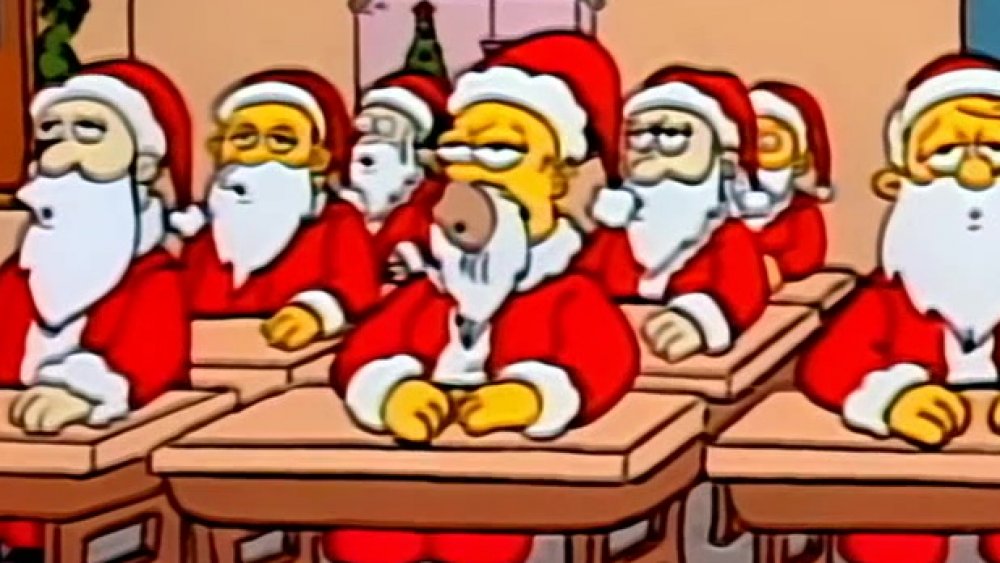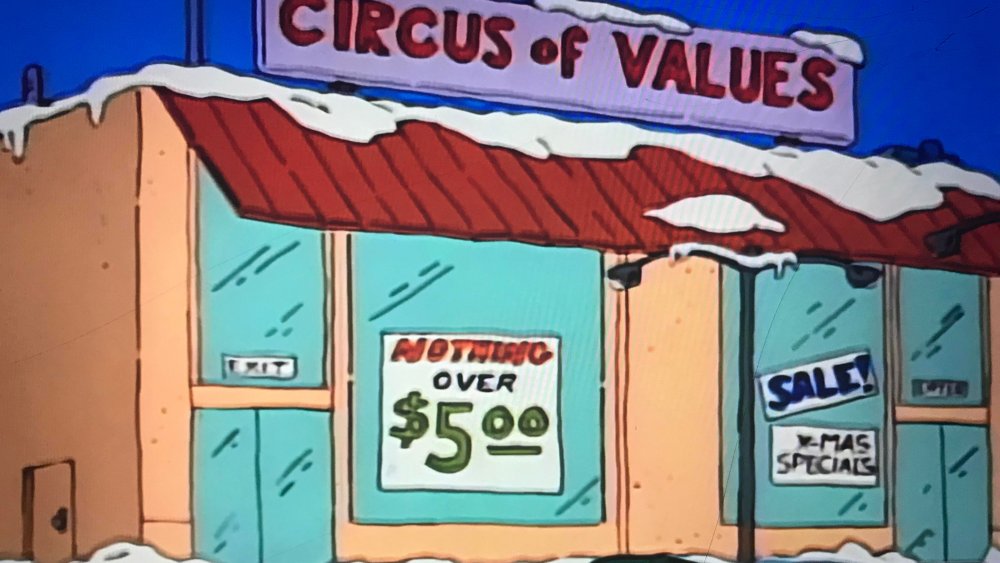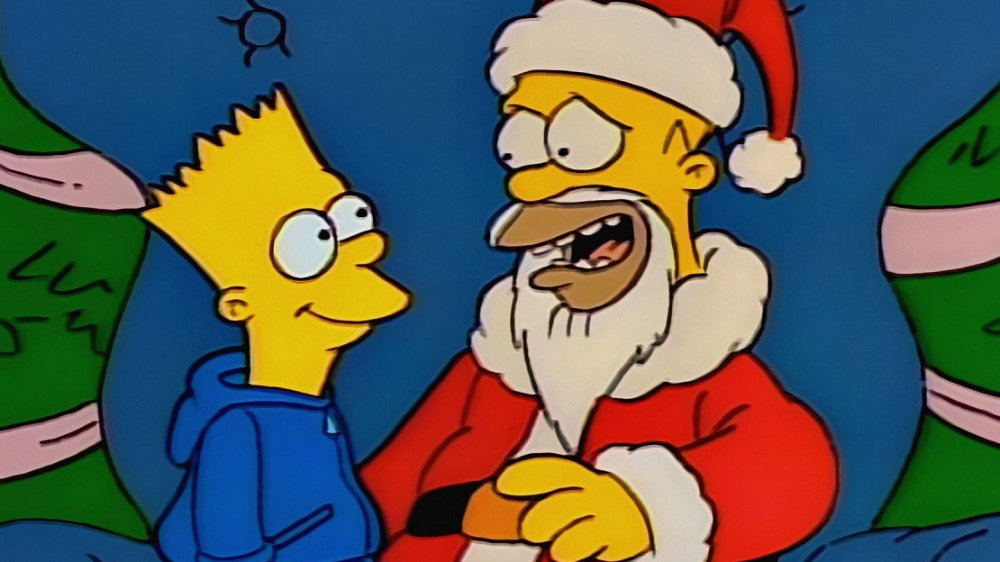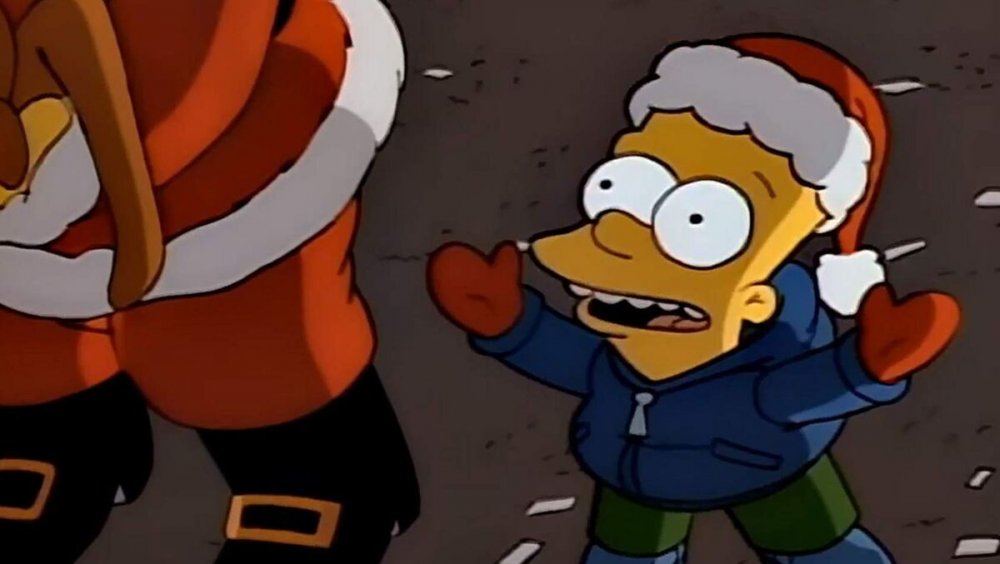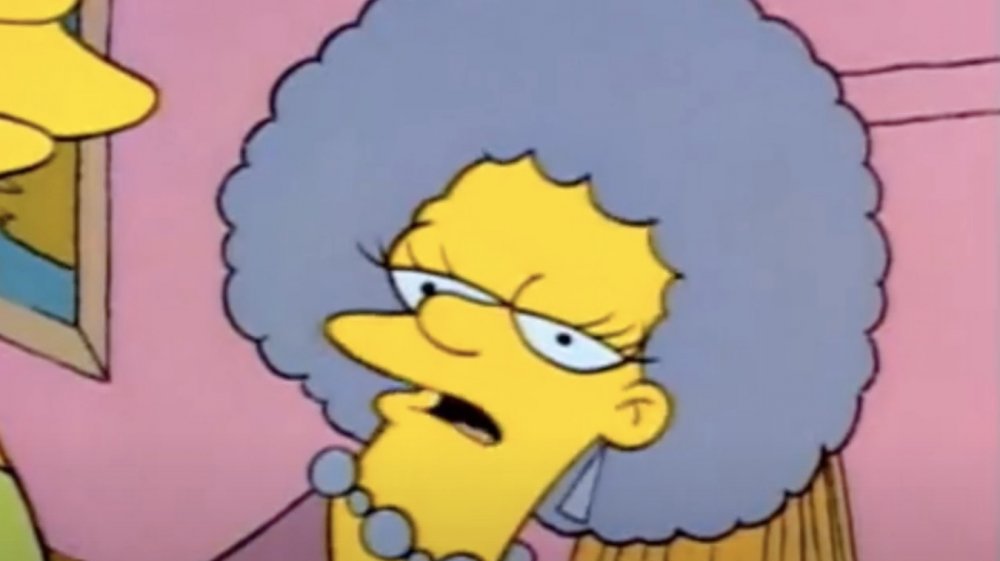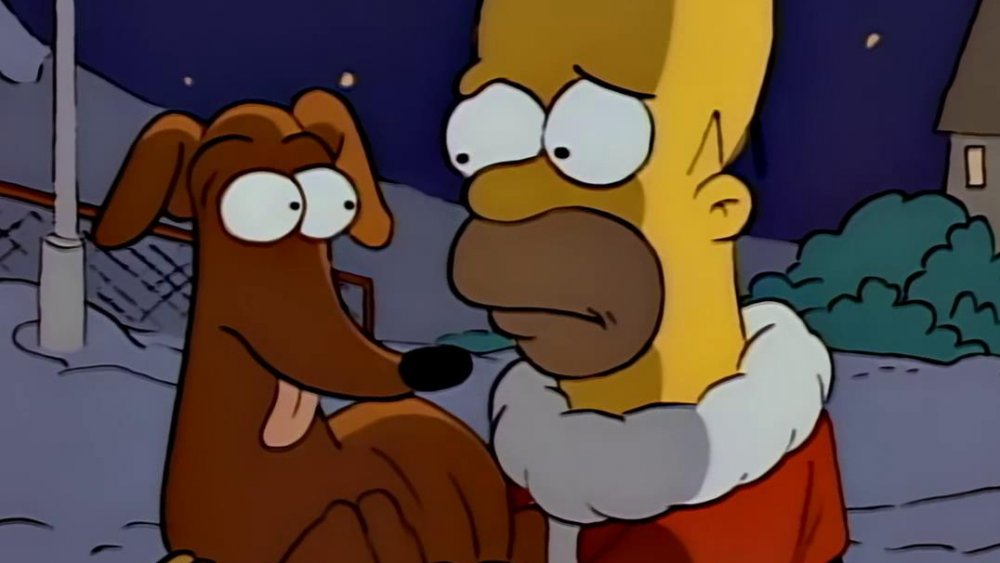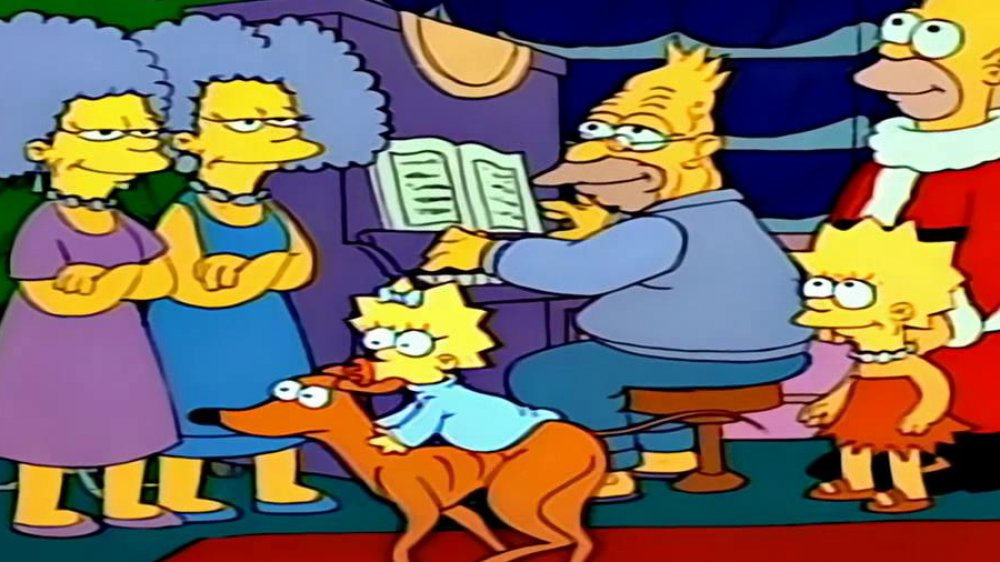Things You Forgot Happened In The Pilot Episode Of The Simpsons
The Simpsons is likely the most reliable presence in television history.
Not counting a brief run on Thursday nights in the early 1990s, the animated series has been the centerpiece of Fox's Sunday evening lineup for an unprecedented three decades. Before that, Matt Groening's cartoon family ran in short, crudely produced segments on The Tracey Ullman Show, one of Fox's first-ever shows. The darkly funny and wryly satirical all-American clan got the call up to the big-time in 1989, debuting in its half-hour form on December 17, 1989 with "The Simpsons Christmas Special," or "Simpsons Roasting on an Open Fire." The series was off and running, on its way to an entertainment empire that would comprise 700 episodes, a big-screen movie, and countless merchandise.
What The Simpsons would become, though, is much different than The Simpsons of that first installment, and it took time for a lot of elements to gel. Here's a look back on how The Simpsons began back in 1989, and some parts of that premiere episode that have been forgotten along the way.
The first episode of The Simpsons was a Christmas special
A TV series pilot episode — so named because it usually serves as a test or "pilot" to gauge network interest in buying a batch or season's worth of episode — is often loaded with exposition, and necessarily so. It's the first time audiences are meeting these characters and exploring this universe, and much has to be explained, however awkwardly that may come across.
The pilot episode of The Simpsons wasn't like that. The pilot for what would become the longest-running series in primetime history, "Simpsons Roasting on an Open Fire," expands a world viewers are already familiar with, as The Simpsons began life nearly three years earlier as a series of short cartoons on Fox's The Tracey Ullman Show. Most people who tuned in were already familiar with the characters — Homer being a grumpy dad, Bart a troublemaker, and Lisa being earnest to a fault, for example. With all that out of the way, the Simpsons pilot is primarily a longer-than-usual opportunity to tell another Simpsons story.
And in this case, it's a holiday story. The first episode of The Simpsons is also the first of many Simpsons Christmas-set installments.
There are some questionable-in-retrospect moments at the Christmas pageant
The first episode in the long history of The Simpsons begins at Springfield Elementary School, where the Simpsons parents are to attend a traditional and festive holiday pageant (in the first of hundreds of sign-based sight jokes, the school's reader board boasts that the show earned a stellar review of "3 and 1/2 stars from the Springfield Shopper). Homer and Marge are late, dealing with icy roads on the way and arrive just in time for "Santas of Many Lands," as presented by Lisa Simpson and her second-grade classmates.
First, Lisa's sometime friend Janey delivers a monologue about German Christmas traditions, detailing the dark story of Santa's servant Ruprecht, who "gives presents to good children and whipping rods to the parents of bad ones." Next up is fan favorite Ralph Wiggum, who doesn't yet possess the blissful unawareness, penchant for non sequiturs, and high-pitched voice that would make him a fan favorite. Instead, he's dressed up like a "Japanese priest who acts like Santa Claus" with eyes in the back of his head to keep tabs on kids, represented with googly-eye-goggles that solicit a gasp from the audience when he turns around.
Finally, it's Lisa's turn, who also takes the cultural appropriation route to portray a South Seas version of Santa Claus. She's barely clothed in a grass skirt, coconut bra, and traditional mask, while she does a fire dance.
Introducing Snowball II
After the pageant's end, the Simpson family makes their way back home to take care of some more festive holiday business.
Bart and Lisa busy themselves writing out their Christmas wish lists, Homer attempts to unload and sort out the outdoor holiday lights, baby Maggie tentatively walks around (and falls down a lot — her signature move), while Marge updates friends and relatives (and viewers) of the crew's recent happenings via a Christmas card newsletter. Via Marge's voiceover, it's established that there has been "some sadness and some gladness" as of late. The good news: Grampa Simpson "is still with us, feisty as ever," so not dead, as some would apparently suspect, Maggie is ambulatory, and Lisa got straight As in school.
As for the bad news, Bart decidedly did not get high marks and the family cat, Snowball was "unexpectedly run over" and moved on to Kitty Heaven. However, Marge relates, they went ahead and replaced the cat with a new one, named Snowball II. Upon the cat's mention in Marge's letter, Snowball II makes his first appearance, and unlike the all-white original Snowball, this one isn't — amusingly, he's dark gray. And she makes a whole situation for Homer, getting all caught up in the Christmas lights.
Homer isn't really Homer yet
Homer Simpson is one of TV's all-time greatest characters. He's simultaneously simple and complex, a man who wants to do nothing more than eat junk food, drink beer, watch TV, and sit on his couch free from being pestered by his kids and wife... and yet he deeply loves those kids and that wife and will do anything for them, while also maintaining an active inner life that involves conversations with his own brain, delusions about his appearance, and imaginary excursions to the "Land of Chocolate."
But all of that would come far later, and over time. In the first episode of The Simpsons, Homer Simpson doesn't show off many of his defining characteristics. He's a grumpy grouch who proclaims to "love Christmas so much" but stomps around the house, yelling and annoyed by tangled extension cords and Marge not paying attention to him. Early in "Simpsons Roasting on an Open Fire," he's eager to get the outdoor Christmas decorations up and ready, which isn't something the remarkably lazy Homer of later years would do. He doesn't even have the right voice yet — actor Dan Castellaneta gives the guy a low, slow grumble, reminiscent of veteran actor Walter Matthau (which he explicitly did on purpose, via the Los Angeles Times).
Bart cons his way into getting a tattoo
Bart and Lisa are a little old to believe in Santa Claus. Nevertheless, Marge asks them if they've completed writing their letters to old Saint Nick. Bart is quick to quip that "there's only one fat guy who brings us presents, and his name ain't Santa." (He's talking about Homer, of course.) Both older Simpsons kids are on brand and in character on their holiday wishes, asking for just one improbable thing each. Lisa wants a pony (which she's written out over and over on her list) while Bart desperately wants a tattoo.
Marge tries to let her daughter down gently. "Santa can't fit a pony into his sleigh," she says. "Can't you take a hint?" Bart's request is angrily rejected by both of his parents. However, Bart takes Homer's off-the-cuff dismissal — that he won't get a tattoo for Christmas but he can buy one with his own money — seriously. The next day, when the family goes Christmas shopping, Bart heads into The Happy Sailor — a tattoo parlor in the mall of all places — and orders up a heart tattoo with the word "Mother" on it. He thinks it's thoughtful, but Marge catches him before it's finished. She has no choice but to use the family's Christmas fund (which she stores in the form of cash in a jar inside of her blue beehive hairdo) for laser tattoo removal.
Homer gets a second job to pay for Christmas
Like many American households, the Simpson family often teeters on the brink of economic ruin. When The Simpsons debuted in 1989, it was downright revolutionary to depict this very realistic and relatable concept on television. Along with Married...with Children and Roseanne, The Simpsons was among a new wave of American sitcoms to depict people living paycheck-to-paycheck, counter to the upper-middle-class worlds of shows like Growing Pains and The Cosby Show. In its very first episode, The Simpsons boldly and provocatively took a non-romanticized look at the lengths families without a lot of money will go to in order to pull off a nice Christmas for their kids.
Marge confidently has some money socked away to buy gifts to put under the tree, but it disappears in an instant. While she's certainly unhappy about losing her nest egg, Marge thanks the heavens for Homer's Christmas bonus. But that doesn't arrive either, on account of how Homer's boss at the nuclear power plant, Mr. Burns, cancels them just before Christmas in order to preserve management pay raises. With both sources of Christmas money gone, Homer has little options besides taking on drinking buddy Barney's suggestion to become a department store Santa.
Tragically, and frustratingly, the second job nets Homer a measly thirteen bucks.
Homer goes shopping at the dollar store
Not wanting to disappoint Marge (or his kids), Homer doesn't actually tell anybody that there won't be any Christmas bonus to fund the holiday. Before taking on the Santa gig, Homer takes Marge's suggestion to heart to "stretch" his technically non-existent bonus. Much to his wife's surprise and delight, Homer offers to do all the Christmas shopping himself, and he gets exceedingly crafty and frugal in his choice of retail establishment, hitting up the decidedly dour and rundown Circus of Values, which proudly proclaims to stock no item that costs more than five dollars.
Homer proves he is both thoughtful and resourceful and actually does a pretty good job picking out dirt-cheap (if lackluster) presents for his loved ones. For Marge, Homer grabs a six-pack of "practical and alluring pantyhose." Paper pads strike Homer's fancy as a gift for Bart, while Maggie can expect a steak-shaped squeak toy. Homer notes that technically "it's for dogs," but justifies the purchase on account of how Maggie is too young to read the label.
Bart discovers Homer working as a mall Santa
In the vast majority of Christmas-themed movies, specials, and episodic television up to the point where "Simpsons Roasting on an Open Fire" aired in 1989, the holiday was all about wonder, magic, and coziness. This first episode of The Simpsons demystifies almost all of that, demonstrating the grueling and often demeaning labor that goes into making Christmas so lovely for so many. To whit, Homer has to moonlight with a temporary job as a Santa, and he has to jump through a lot of hoops to get there. He has to submit to a job interview and then attend a "Santa School," where he's trained in the proper way to say "ho ho ho" and quizzed on the names of Santa's flying reindeer, all under the eye of a strict, hard-to-please teacher. The whole ordeal leaves Homer an exhausted Scrooge.
When he does get the opportunity to portray Santa in a store, he steals a little kid's doughnut, complains about "Mrs. Clause's sisters" (meaning Patty and Selma) to another, and the ruse is ruined when Bart, acting on a dare from Milhouse — and apparently not recognizing his father — yanks off the white costume beard. Homer has to let Bart in on his plan to save Christmas, and the generally cynical troublemaker is genuinely touched.
There are lots of scenes at the dog track
Despondent after his plan to generate holiday cash earned him a pitiful $13 — down from a net of $120, minus taxes, training, costume rental, and "Christmas Club" — Homer doesn't know how he's going to get presents for the family, seeing as how by this point, it is nighttime on Christmas Eve. But in walks Barney, for whom $13 is plenty to take to the Springfield Downs dog track and bet on a pup named Whirlwind. Barney suggests Homer come along, but he's reluctant to bring Bart with him to such a "sleazy" place. Bart talks Homer into it with an impassioned, meta monologue. "If TV has taught me anything, it's that miracles always happen to poor kids at Christmas," Bart says. "It happened to Tiny Tim, it happened to Charlie Brown, it happened to the Smurfs, and it's gonna happen to us."
Off to the track they go, with Homer still defeated until hearing of a late entry to a race: a dog named Santa's Little Helper. Homer, still in his mall Santa costume, believes it to be a sign. So, he puts his $13 on the 99-to-1 long shot... and loses. He suffers one final indignity that evening, sorting through discarded receipts in the track's scuzzy, cigarette-laden parking lot looking for a winner. Barney, meanwhile, won big, and he cruises by in a convertible (with the top down, despite the winter weather) with a woman named Daria.
Mean Aunt Patty gets a dressing-down
Meanwhile, back at the Simpson home, Marge, Lisa, Maggie — along with guests Grampa Simpson and Marge's surly sisters, Patty and Selma — kill time by watching a holiday special featuring the stars of The Happy Little Elves, an in-universe Smurfs clone that Lisa adores, but Grampa calls "unadulterated pap." The always critical Bouvier sisters notice Homer's absence as it gets later into the evening. "It's typical of the big doofus to spoil it all," Patty cruelly mutters.
But Lisa hears it, and boldly asks to hear it again. Patty coldly explains that she was "just trashing your father." Lisa, all of seven years old, stands up to her mean aunt and coolly and articulately takes her to task for insulting her dad, who unbeknownst to everyone, is off trying to save Christmas. "Aside from the fact that he has the same frailties as all human beings, he's the only father I have," Lisa retorts. "Therefore, he is my model of manhood, and my estimation of him will govern the prospects of my adult relationships. So I hope you bear in mind that any knock at him is a knock at me."
The dog who saved Christmas
But Bart was right — miracles do happen to poor characters at Christmas (or at least they do on television). Immediately after Homer's parking lot search for a score turns up nothing, a dog track operator, in a shocking bit of animal cruelty, tosses out the losing greyhound, Santa's Little Helper. The dog runs away from the loud and irate guy, yelling stuff like "beat it!" and "scram!" and "you came in last for the last time!"
Fearing for his safety, the poor pooch runs directly into the arms of a good human: Homer Simpson. He absolutely does not want to keep this dog... at first. "Can we keep him, Dad? Please?" Bart asks. Homer, scowling, refuses. "But he's a loser! He's pathetic!" Homer explains. But then the dog licks his face, and Homer realizes, "He's a Simpson." Santa's Little Helper becomes the gift to a thrilled family, and so, the holiday is saved.
The episode ends in a wacky singalong
While it's so different from so many TV sitcoms that preceded it, The Simpsons ends its first episode in a way that's been tried-and-true by Christmas installments past: with a holly-jolly Christmas carol singalong.
With Grampa Simpson at the piano, the extended Simpson family warbles its way through "Rudolph the Red-Nosed Reindeer." Bart and Lisa punctuate the song's well-known lyrics with their own additions, from the mild "like a light bulb" to "you would even say it glows" to the slightly profane — Bart says one of the "reindeer games" Rudolph isn't allowed to play is "strip poker." This slowly infuriates Homer, his rage surpassed momentarily when he takes a solo at Marge's urging. However, he doesn't know the words to the song — "Rudolph get your nose over here so you can guide my sleigh today" is not, in fact, a canonical lyric. Bart gets in one last crack, joking that Rudolph will "go down in history" like "Attila the Hun." But he doesn't get that line all the way out, as Homer — in what would become one of the show's most audacious and horrifying running bits — strangles Bart.
It's heard, but not shown on-screen, but this still has to mark the first successful pilot episode (and holiday special) to conclude with an act of child abuse.
